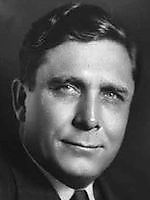|
| Affiliation | Republican |

|
| |
1940-01-01 |
|
|
| Name | Wendell L. Willkie |
| Address |
Rushville, Indiana , United States |
| Email | None |
| Website | None |
| Born |
February 18, 1892
|
| Died | October 08, 1944
(52 years)
|
| Contributor | 411 Name Removed |
| Last Modifed | Chronicler
Jul 24, 2020 07:55pm |
| Tags |
Married - Freemason - Presbyterian -
|
| Info | "No man has a right in America to treat any other man tolerantly, for tolerance is the assumption of superiority."
- Wendell Wilkie
Wendell Lewis Willkie was the Republican nominee for the 1940 presidential election, defeated by Franklin D. Roosevelt. He was born in Elwood, Indiana on February 18, 1892.
Willkie was a delegate to the 1924 Democratic National Convention from Ohio. He later moved to New York City, where he lived the remainder of his life although he continued to claim to be from Indiana.
Originally a Democrat, Willkie switched parties in 1939 in opposition to Franklin D. Roosevelt's New Deal. Willkie campaigned against the New Deal and the government's lack of military preparedness, being one of the early politicians to raise consciousness about the dangers of Nazi Germany. The fall of France just prior to the Republican National Convention in 1940 propelled Willkie to the presidential nomination.
On election day Roosevelt received 27 million votes to Willkie's 22 million, and in the electoral vote, Roosevelt defeated Willkie 449 to 82. Willkie's popular vote was the most given to a Republican presidential nominee at that time.
After the election, Willkie became one of Roosevelt's most unlikely allies. To the chagrin of many in his party, Willkie called for greater national support for controversial Roosevelt initiatives such as the Lend-Lease Act and embarked on a new campaign to awaken America from its isolationist slumber. On July 23, 1941, he urged unlimited aid to the United Kingdom in its struggle against Nazi Germany. That same year he traveled to Britain and the Middle East as Roosevelt's personal representative, and in 1942 visited the USSR and China in the same capacity. In 1943, Willkie wrote "One World", a plea for international peacekeeping after the war. Extremely popular, millions of copies of the book sold. The book helped to bring the U.S. out its isolationist slumber. Also in 1943, together with Eleanor Roosevelt and other Americans concerned about the mounting threats to peace and democracy, Willkie helped to establish Freedom House.
In the 1944 presidential election Willkie once again sought the Republican nomination, choosing his wife's hometown, Rushville, Indiana, as his campaign headquarters. But his liberal progressive views gained little support due to the rightward shift of the Republican Party. He staked his campaign on the Wisconsin primary, and when he lost there, he withdrew from presidential contention.
After the Republican National Convention, Willkie did not announce his support for either Roosevelt or Dewey. Instead, he wrote a series of articles trying to get both nominees to be more specific about where they believed the country needed to head after WW2 ended. In his final article, Willkie rejected the portion of the platform of both parties related to issues surrounding African Americans, calling for new and immediate civil rights measures.
After surviving several heart attacks, Willkie finally succumbed, dying in a New York hospital on October 8, 1944 at age fifty-two (four days after Alfred E. Smith died). Eleanor Roosevelt in her October 12, 1944 "My Day" column eulogized Willkie as a "man of courage.... (whose) outspoken opinions on race relations were among his great contributions to the thinking of the world." She concluded, "Americans tend to forget the names of the men who lost their bid for the presidency. Willkie proved the exception to this rule."
Willkie is buried in Rushville, Indiana.
|
|
| Start Date |
End Date |
Type |
Title |
Contributor |
|
| Date |
Category |
Headline |
Article |
Contributor |
|
|

